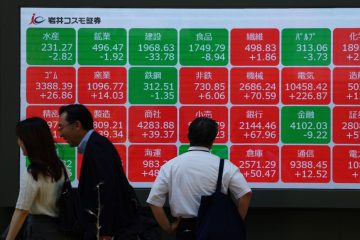This New Asset Management Firm Will Cut Your Pay If You Don’t Beat the Market
Peter Kraus took the helm of investment management firm AllianceBernstein at the height of the financial crisis. It lost more than 40% of its assets under management in 2008.
As the new CEO, Kraus tried to slow the bleeding by slashing fees and diversifying investment strategies. But there was one thing that was much harder to recover — client trust. In his decade at the firm, Kraus saw more clients moving their assets to passive investing funds, meaning they didn’t believe that human portfolio managers could outperform the market.
For context, flows out of actively managed U.S. equity mutual funds spiked to $ 264.5 billion in 2016, while flows into passive index funds and ETFs were $ 236.1 billion, according to data provided by the Vanguard Group and Morningstar. That marked the greatest calendar-year asset change in the last decade.
In his last few months at AllianceBernstein, Kraus attempted to launch a performance-fee fund to re-gain control and earn back client trust. Securities and Exchange Commission officials approved the concept. But in April 2017, AllianceBernstein’s parent company abruptly fired Kraus and his team after a reported clash over management style and succession plans.
Now, Kraus is back with a new venture that aims to address the problems he saw plaguing the asset management industry. With $ 4 billion in seed capital from Italian insurer Generali, Kraus will attempt to turn the industry’s standard fixed-fee structure on its head.
His new firm Aperture Investors employs a performance-based fee fund model. In other words, it will charge base fees comparable to low-cost ETFs, and investors will only pay additional fees if the funds outperform the market. There are no fixed fees, which is the industry standard at the moment. At Aperture, portfolio managers’ compensation will be tied to their performance. (See the formula behind the strategy here.)
In this wide-ranging interview, Kraus talks about misaligned incentives in the asset management industry, what happens when you tie compensation to performance, and why his industry peers hope he fails.
TERM SHEET: In your last months as the CEO of AllianceBernstein, you employed a similar performance-based fee strategy. How did you come up with this model in the first place?
KRAUS: I had been thinking about this for five years, and I came to this issue because I think the asset management industry and its clients are going in different directions. I think clients are saying, “I don’t trust you anymore.” It’s been evolving for a long period of time, but it has become prevalent in the last five to 10 years. It took a while for me to believe that it was a structural as opposed to cyclical issue, and over the last few years, it’s become completely clear to me that it’s a structural disadvantage. There are two main reasons for that.
One is that asset managers are paid a fixed fee and that incentivizes the growth of assets as opposed to the performance of those assets. It’s true that if you don’t have performance, you can’t gather assets, but the range of performance you can have is quite wide, and you’re paid no different depending on that range. You are paid differently if the assets grow.
There’s a clear, unambiguous, inarguable maxim that the more money you manage, the more challenging it is to perform. So you have a fee structure that actually incentivizes the company and the manager to grow assets, which undermines the very performance that the client is hiring the manager to produce. That does not seem to a be good thing.
But it’s always been that way, right?
KRAUS: It’s always been that way, and this leads to the second problem, which is that over time alpha (or “outperformance”) has become more challenging. This is an important point — alpha didn’t go away, but it’s become more challenging. The number of people who can actually create alpha is smaller yet the barriers to entry remain the same. People got paid this fixed fee whether they performed or they didn’t, and the dollars of savings that are pursuing managers has grown significantly over 30 years. Thirty years ago, the pool of capital that you applied to the capital markets was smaller, the capital markets were smaller, and the information was more slow to develop. Today, the latency factor is much shorter, there’s more money relative to the capital markets, and the markets are more efficient.
All of that leads to bigger challenges for active managers, but it doesn’t lead to the elimination of alpha. So the second big problem is that people and institutions never own one manager — they tend to over-diversify the number of managers. What happens is that over-diversification affects risk. The problem with lowering your risk is that you also lower your return. You can’t get return without risk.
So how do you plan to solve these problems?
KRAUS: What we’re saying to the world is that every manager you pick at Aperture is there because they believe they can perform, have a proven track record with performing and are voting with their feet (meaning they don’t get paid unless they perform). They’re also attempting to produce performance that’s going to increase their income, which means they’ll optimize their risk.
What we’re saying to people is, “Look, if we don’t perform, you just pay the ETF fee.” Don’t take on too many managers. Take on managers where you have a higher probability that they will perform because they only get paid if they perform. Don’t have 100% of your assets in them. Have 50% of your assets in them and have the other 50% in passive.
The good news about passive is that it’s a valuable tool, but it’s a tool. It gives you exposure to the market at a low cost. Now, your manager can focus on creating alpha, and if you just pay the manager for alpha instead of market exposure, now you have something that works.
Those ideas are pretty unconventional relative to how the industry operates.
KRAUS: We’re questioning a lot of conventional thinking. The conventional thinking is “You have diversified managers.” We’re saying, “Yes, but you’re unhappy with your diversified managers, so you went to beta [plain market exposure]. You’re conflating two issues. You think managers can’t perform. That’s not true. Managers can perform, but you do two bad things. One is that you pay managers whether or not they perform, so they have an incentive to grow assets, which makes it more difficult for them to perform, so then picking them is harder. And you over-diversify because you think you’re lowering your risk, but what you’re actually doing is creating an environment in which you can’t perform.”
Right, but isn’t it difficult to get people to switch managers?
KRAUS: Absolutely. We had a meeting yesterday with a prospective institution to allocate money to us, and they said exactly that — ”How do we know this compensation ecosystem and this fee system you built will work?” And I asked, “OK which risk do you want to take? Do you want to take the risk that you’re paying a manager whether or not they perform, or do you want to take a risk where a system you think makes sense doesn’t work?”
What do you think is the biggest mental hurdle investors will need to overcome in order for a system like this to work?
KRAUS: I think that people are inherently conservative with their money, and they will accept as having no risk where they are, even though where they are may have substantially more or the same risk as moving it. In other words, if you’re doing what you’ve always done, you’ve already accepted all of those risks, and you don’t really question it. Now, if you’re about to move your money to passive because you’re upset, then that’s an interesting decision point because you’ve decided that the active managers don’t work. But if you’ve concluded that active managers actually can’t perform, then you won’t even talk to me because you’ve got a view that humans can’t perform. And that’s a wrong view, in my opinion.
At what point did client trust in the industry erode? Is this a generational thing?
KRAUS: I think all age categories are questioning their trust in the industry. I think people of a younger generation who never established a bond with the industry before find it easier not to trust them because they never did. But people who are 65 years old are also looking at it and thinking that this doesn’t work. I don’t think it’s substantively different by age. What we’re saying to both of those populations is we understand that in order to re-establish trust, we need to do it differently. We can’t just lower our fees — that won’t change the game. What changes the game is that we don’t make any money unless you do. Now, we’re on the same page.
If compensation is directly tied to performance, doesn’t it incentivize the manager to take outsize risk in some cases?
KRAUS: The concern people have with performance-based fees is that it engenders too much risk. What you want is people to take risk, you just don’t want them to take too much. And “too much” is a silly term because, well, what’s too much? “Too much” is only determined in the past because when you’re taking the risk in the present, you don’t think it’s too much.
What should define “too much” is a set of financial incentives that actually encourage risk-taking notwithstanding the return. The traditional high-water mark structure in a hedge fund engenders that behavior. People think it protects them, but it doesn’t. Why?
Let’s say I’m a hedge fund manager. Last year, I made $ 10 million, half of it’s deferred, but it’s only deferred for time, there’s no clawback against it. The next year, I lose 5%, I don’t get paid anything. The next year, in order to get paid, I have to make back the 5%. You, the client, think that’s great. But what do I think? I think I’ve got to take more risk. That’s a bad place to be.
At Aperture, we don’t have high-water marks. We reset every year. If you’re down 5%, you start the next year at zero. If you’re up 5% next year, you actually get paid. But over three years, you have to earn the client the return that generated the compensation in the first year.
And if you don’t?
KRAUS: Then you lose some to all of your deferred, which is half of your compensation. Let’s say you make a $ 10 bonus in Year 1, so $ 5 will be deferred. At a minimum, your return needs to match the benchmark for the client in Year 2 and 3, otherwise you lose some or all of $ 5. And by the way, of the $ 5, at least $ 2.5 is in the fund. So if you look at compensation over time, at any point in time, the manager has half of their compensation or more in the fund, so their money is actually at risk too.
There are two things that are causing the manager to be careful about risk — one is their own money and two is their deferred.
After interviewing 80 portfolio manager candidates, you’ve only hired three so far. What characteristics are you looking for when hiring a manager?
KRAUS: I’m looking for managers who are able to make money — meaning create alpha — in different kinds of market conditions. Two, they need to have a demonstrated track record in 10+ years of doing that. Three, they need to be good culture carriers of the firm. I’m interested in people who are collaborative, who are not passive aggressive, and who are willing to say what they think. I’m looking for four general characteristics — they are patient, self-aware, focused, and humble.
In terms of incentives, what type of person rejects a structure where they get paid whether or not they perform and wants to join a firm that pays them only if they perform?
KRAUS: Well, with this model, you have the opportunity to make much more money. I also think it’s people who are more interested in delivering to clients what they’re in business for rather than getting drawn into a marketing process and an asset-gathering process that is counter-productive to why they do what they do. Portfolio managers like investing. That’s why they do it. They keep score. Their scorecard is based on how much they performed, it’s not really about how many assets they have. If their scorecard is how much do I earn, then why are you paying them a fee that’s not related to how much they outperform?
Our view is that we’re going to pay you on the scorecard of how you perform. Yes, it’s true that the more assets you have, the bigger your compensation will be, but it’s levered to the performance so the number of assets you have to have is quite a bit less.
How have your industry peers reacted to your firm’s model?
KRAUS: When they’re talking to me, they’re saying, “Wow, this is really interesting.” But the bubble behind their head is, “I hope that fails because if it doesn’t, my business is in trouble.” If it works, their clients will demand they do it too. Their business is built on a fixed-fee model, so consider the de-leveraging that happens when they go to a variable model, and they’ve picked a bunch of managers that are used to doing what they do now.
The question I’m asked most often by industry peers is, “How do you actually run the firm like that?” If you look at the cost structure of a traditional firm, a third of the costs go to pay the investment team, a third goes to the asset accumulation business, and a third goes to technology and operations. Here, 70% of the cost goes to the portfolio managers and 30% is split between marketing and operations.
As we discussed, this isn’t your first time trying a performance-based fee strategy. What did you learn from the experience at AllianceBernstein?
KRAUS: The issue I had at AllianceBernstein was convincing portfolio managers that they should do this. I had some funny conversations where I would go, “We should do this,” and they would say, “Well, I don’t perform all the time.” And I would say, “Yeah, I got that.” And they would look at me like, “I don’t get paid if I don’t perform.” And I would go, “Mmmhm. You want to tell the client that?” And they would go, “Yeah you’re right.” So I said look, if we want to grow this firm and we want to win back clients’ trust, we’ve got to do this. The biggest thing I learned there is that client trust is the key.
I watched a video in which you say that blockchain technology will change the financial services industry. How do you think about blockchain in relation to what you’re doing at Aperture?
KRAUS: I am very interested in blockchain, and we are exploring a lot of ways to use it, and we think we found an interesting application for it recently. I’m not ready yet to say what it is, but I’ll give you a little context.
When you look at these businesses that are “blockchain-enabled,” the sustainable value proposition is the ability of the chain to reduce costs, increase efficiency, minimize errors, and prevent fraud. The value is that you used to pay a dollar to get something done, and now you pay 10 cents. We look at systems we’re engaged in where we have multiple parties touching an asset and charging multiple fees. If you accumulated those fees, they’d be let’s say 100 basis points, which we could replicate on the chain for 20 basis points. So that’s 80 basis points of value, and then you can talk about how much of those basis points goes to the client, how much goes to Aperture, and how much goes to the chain. But then, the client can actually sit at the table and get something.
That’s why the blockchain is so interesting — this is an industry that’s essentially over 100 years old in the way that it transacts. It’s an old system. I think all the traditional players will be drawn into using it. It’ll take a while, but it’s going to happen.
What do you foresee as the biggest risk to your business?
KRAUS: Over time, it’s performance. Because the seed capital that Generali is contributing has a five-year duration to it, we have quite a bit of time to perform. And if you don’t perform in five years, you should be dead.










